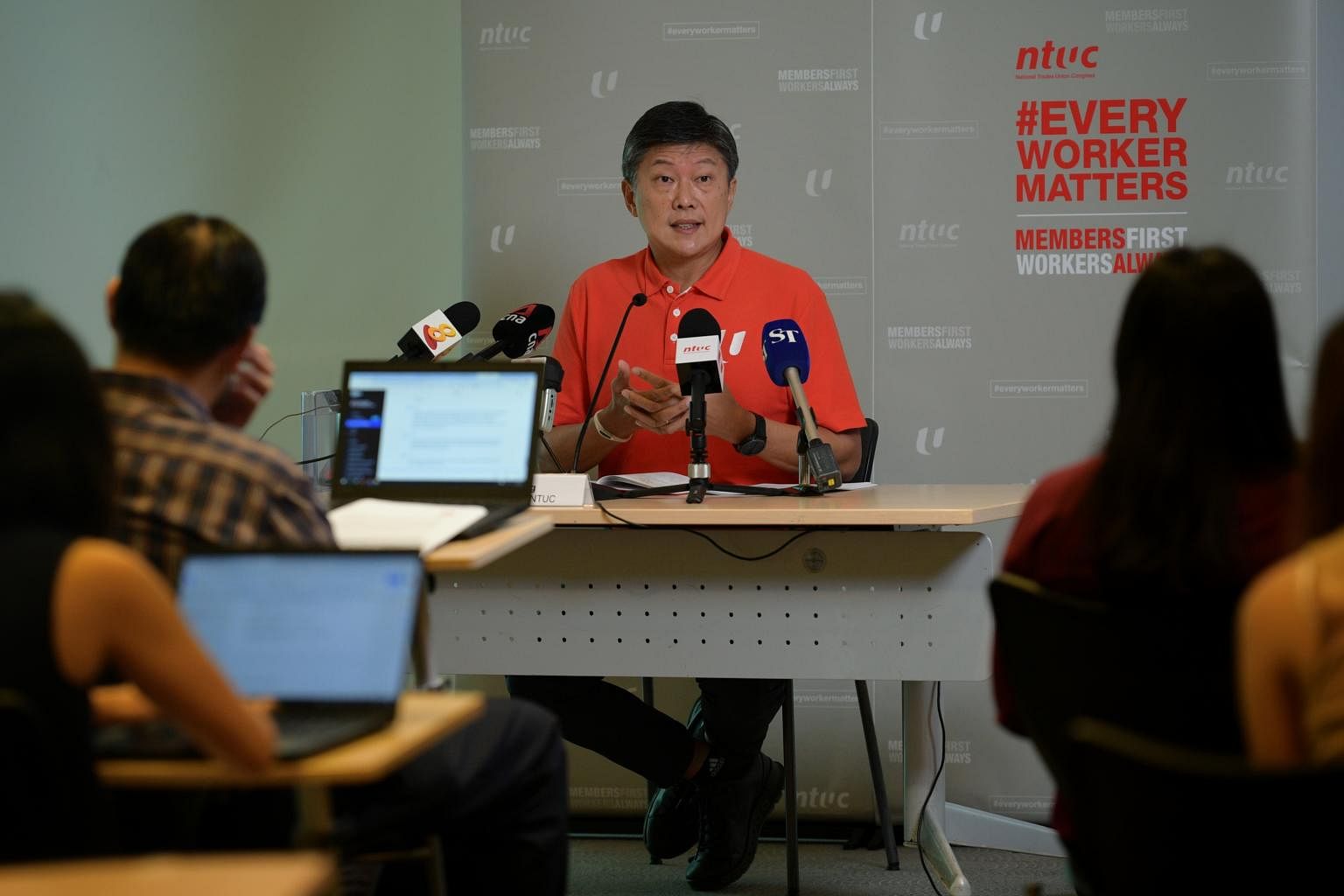Over 46,000 workers matched to new jobs by NTUC's e2i since pandemic hit Singapore
Sign up now: Get ST's newsletters delivered to your inbox

Labour chief Ng Chee Meng said NTUC will continue to push for better jobs and wages through training and business transformation.
ST PHOTO: NG SOR LUAN
Calvin Yang
Follow topic:
SINGAPORE - More than 46,000 workers have secured new jobs with the help of the National Trades Union Congress' (NTUC) Employment and Employability Institute (e2i) since the Covid-19 pandemic hit Singapore two years ago.
These workers were placed in new jobs from February 2020 to December last year. It comes after the NTUC's Job Security Council was set up to help displaced workers or those at risk of losing their jobs move to new roles or secure temporary secondments.
This is not an easy task, labour chief Ng Chee Meng said on Monday (Feb 7).
"It is a consistent hard slog to do the best to match workers back to jobs."
A total of 266 companies have completed road maps that help them transform their businesses and adopt technologies to meet market needs, NTUC said in a statement.
Meanwhile, 811 company training committees, which identify skills that workers need to keep up with industry transformation and curate relevant training for them, have been set up to date.
But this is still far from the NTUC’s initial target to form training committees in 1,000 companies in the three years after the initiative was launched in April 2019.
Stressing that it is a “very detailed process” Mr Ng, who is the NTUC secretary-general, said: “We are limited by our own resources, because it is a very involved process that my officers go down to the companies and engage them.”
Mr Ng said there are plans to scale up the initiative, which “can be a needle mover”.
NTUC will continue to push for better jobs and wages through training and business transformation, Mr Ng highlighted.
This is one of its priorities for this year, as Singapore recovers from the pandemic.
NTUC has been working with tripartite partners to explore how workers across large and small enterprises in the same sector can benefit from transformation efforts.
These include establishing tripartite academies in growth sectors and those affected by the pandemic. The academies can be run by operators with the resources to bridge skill gaps and improve job-matching results.
For instance, NTUC has started discussions with e2i, the Singapore Tourism Board and various hospitality and consumer business unions to pilot a career hub for the hard-hit tourism sector. It will offer skills training and facilitate job matching, among other tasks.
Growth sectors such as advanced manufacturing, retail and security have also been identified for this initiative.
NTUC is also looking to champion the interests of various segments of workers, including lower-wage workers, self-employed persons, youth, women and seniors, said Mr Ng.
For lower-wage workers, it will continue to work closely with tripartite partners to expand the Progressive Wage Model to more sectors and occupations. This would ensure that "our lower-wage workers' wage growth keeps up with the cost of living and their income growth continues to keep pace with median wage growth", said NTUC.
The Covid-19 pandemic has also amplified work issues faced by self-employed platform workers, such as food-delivery riders. NTUC said it will continue to look at pushing for better working terms and conditions, and boosting medical coverage for such workers, among other areas.
Other workers that it will be focusing on this year include women who wish to return to the workforce. It has been engaging companies to redesign job roles and adopt family-friendly practices, such as flexible work arrangements.
Older workers will also continue to be on NTUC's radar.
"With our economy showing signs of recovery, NTUC will work closely with tripartite partners on implementing the next steps, with a clear timeline, on raising the statutory retirement and re-employment ages to 65 and 70, as well as increases to Central Provident Fund contributions, so that it will stop tapering down until the age of 60, by 2030," said NTUC. It added that older workers will also get help to reskill and take on new jobs in the digital economy.
For local professionals, managers and executives (PMEs), particularly those in their 40s and 60s, NTUC will work with partners to champion fair workplace opportunities and strengthen the employment pass framework in their favour.
The cost of living remains a major concern amid rising inflation, said Mr Ng.
“The best way to beat inflation, cope with cost of living as a sustainable strategy has always been upping our productivity and therefore keeping our workers in pace with any changes in cost.”
“The best way to beat inflation, cope with cost of living as a sustainable strategy has always been upping our productivity and therefore keeping our workers in pace with any changes in cost.”
To do this, NTUC will work with industry partners to ensure businesses can thrive and help workers to upskill, so that they can earn good wages and have better work prospects.

<p>pixcovid28/ST20210927_202120524479/Ng Sor Luan Generic scenes at Raffles Place on the first day of tighter restrictions on September 27, 2021.</p>
PHOTO: ST
This year, NTUC's group of social enterprises will continue to implement measures to cushion the impact of rising costs.
For instance, FairPrice supermarket chain had earlier announced the continuation of discount schemes for seniors and low-income families at all its stores till the end of this year.
The FairPrice group will soon announce initiatives to help workers and their families cope with rising living costs, said Mr Ng. "We can only do our very best, because there are real business cost increases."

